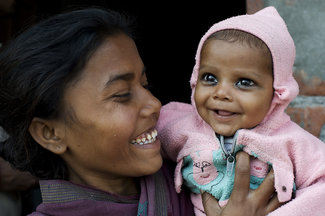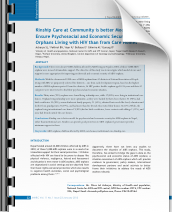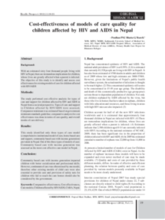

Displaying 611 - 620 of 679
The state cabinet of Goa, India recently approved a foster care scheme to assist children deprived of parental care or the care of guardians and in need of protection.
The Millennium Development Goals will come to an end in 2015 and discussions are currently taking place on what framework will replace them. Children’s participation is crucial to these discussions. Between July 2012 and March 2013, members of Family for Every Child consulted with children living in seven different countries. This report summarizes the main findings that emerged from these consultations.
The objective of this study was to investigate which model of care and support is more appropriate for improving psychosocial and economic security of AIDS orphans in Nepal.
This study, a first of its kind in the country as far as we could ascertain, focuses on the foster care services provided by various organisations and institutions in India.
The objective of this study was to provide basic information on the current situation of children under institutional care in the entire country of Sri Lanka, in order to identify the issues affecting those institutionalized children and to recommend plausible solutions.
MenCare India shares personal anecdotes from its 2013 Fathers Care Campaign.
This four-page publication describes World Vision and Promundo’s work in Sri Lanka in 2012-2013 as part of the MenCare campaign.
A report examining the experiences and attitudes of men involved in non-traditional care activities and roles in Brazil, Chile, India, Mexico, and South Africa.
In its Annual report (2011-2012), the Indian Ministry of Women and Child Development reports on progress in the implementation of the Integrated Child Protection Scheme (ICPS), a new policy and programmatic strategy that specifically articulates the need to move away in approach and services from over-reliance on institutional care and towards responses that support family based care.
This research study aimed to identify and assess the cost effectiveness for existing models of care for children affected by HIV and AIDS in Nepal. The study performed a cost effective analysis for three types of care models in order to provide program managers and childcare professionals comparative economic evidence of the cost of caring for these children.








